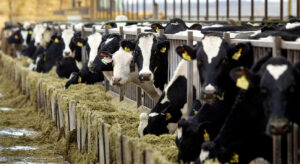By Kyle Aristophere T. Atienza, Reporter
FARMERS said any tariff concessions extended to the US on agricultural goods will favor “privileged importers” while harming workers and the environment.
“We reject any response that leads to a race to the bottom — slashing tariffs on key agricultural commodities, weakening labor protections, or compromising environmental standards,” Samahang Industriya ng Agrikultura spokesman Jayson H. Cainglet said via Viber.
“Trade policy must be shaped by the national interest, not by external pressure or short-term market gains of a few privileged importers,” it said.
Philippine officials are set to fly to the US this week for negotiations to convince President Donald J. Trump not to impose a 20% tariff on imports from the Philippine exports starting Aug. 1.
Secretary Frederick Go, the President’s adviser on investment, said last week that the Philippines is pursuing a bilateral deal with the US, up to and including a free trade agreement.
Mr. Cainglet noted that negotiators from the Philippines have failed to consult farmers.
“We strongly caution against rushing into such a deal without considering its broader implications for our domestic economy,” he said.
The proposed 20% US tariff rate for Philippine goods was higher than the 17% rate announced by Mr. Trump in April.
At that time, the Department of Agriculture (DA) said it was diversifying the markets for its agriculture exports in preparation for higher US tariffs.
In a July 7 statement, the DA noted that “international market access is expanding” for Philippine farm goods.
“Durian, mangoes, and avocados have secured new export approvals, while tamban (a type of sardine) has been officially recognized by the EU Codex, paving the way for broader sardine exports.”
The Philippines charges a 34% tariff on US goods. Its trade surplus with US amounted to $4.9 billion in 2024.
Mr. Cainglet said Philippine exports that will be affected the most by the new US tariff rate are semi-processed goods like coconut oil, desiccated coconut, canned pineapple, and coconut water.
The Philippine Coconut Authority (PCA) said in a statement on Sunday that it met on July 8 with chief executives of leading coconut processing firms, who “stressed the importance of continued negotiations with the US to reduce tariff barriers.”
“Major processors pledged to back PCA’s replanting initiatives, assuring international buyers that the Philippines can maintain a stable supply of high-quality coconut products,” it said.
While global demand for coconut products “continues to grow,” climate change and international trade regulations “present new challenges for producers,” it added.
“A unified strategy is key to protect farmer livelihoods and maintain the country’s dominant market position.”
Mr. Cainglet urged the government to prioritize the welfare of producers over that of importers and traders in its negotiations with the US.
“The US tariff should be viewed as a signal of how the US is protecting its own farmers, manufacturers, and domestic markets,” he said.
“Tariffs, when used strategically, can serve as essential tools to support local agricultural production, promote industrial growth, protect jobs, and preserve rural livelihoods.”

